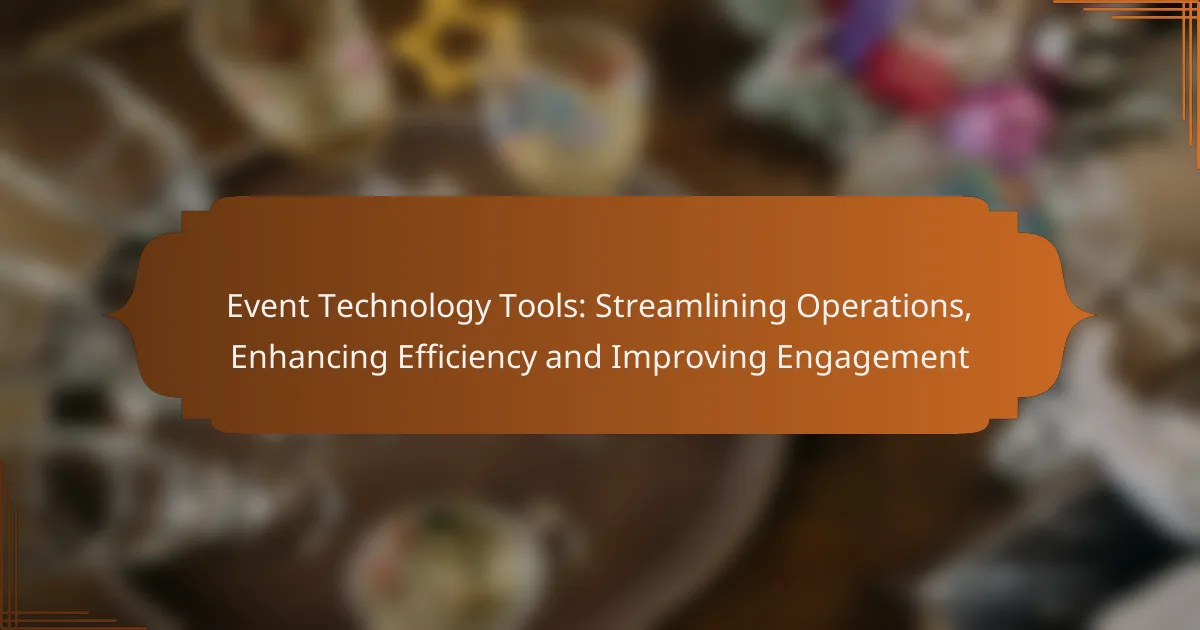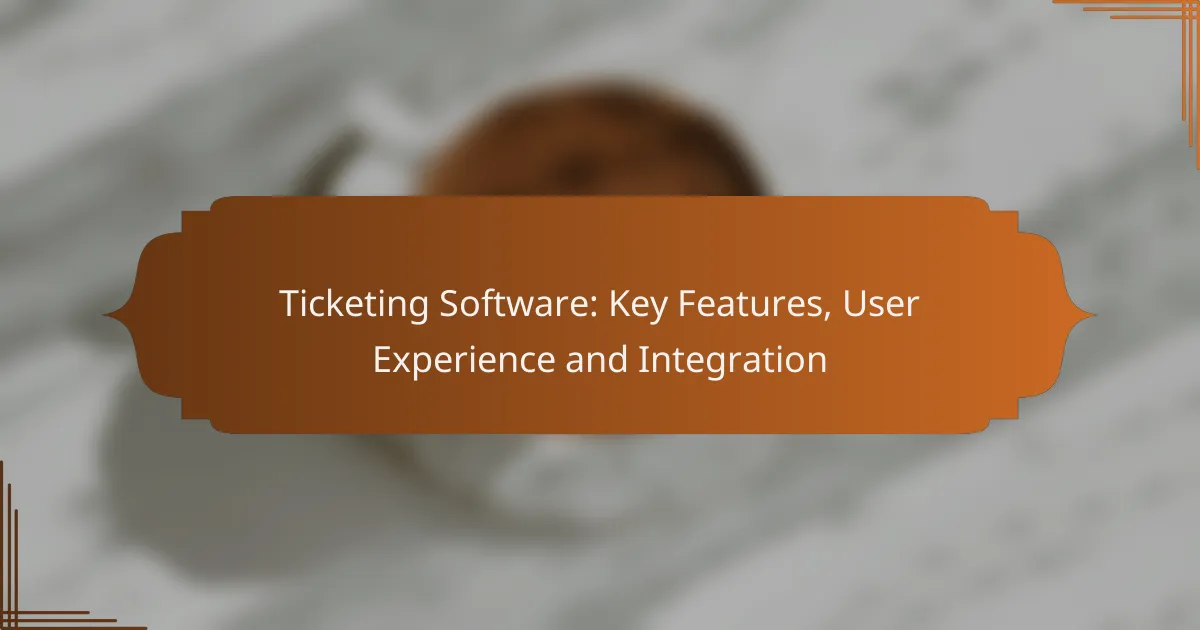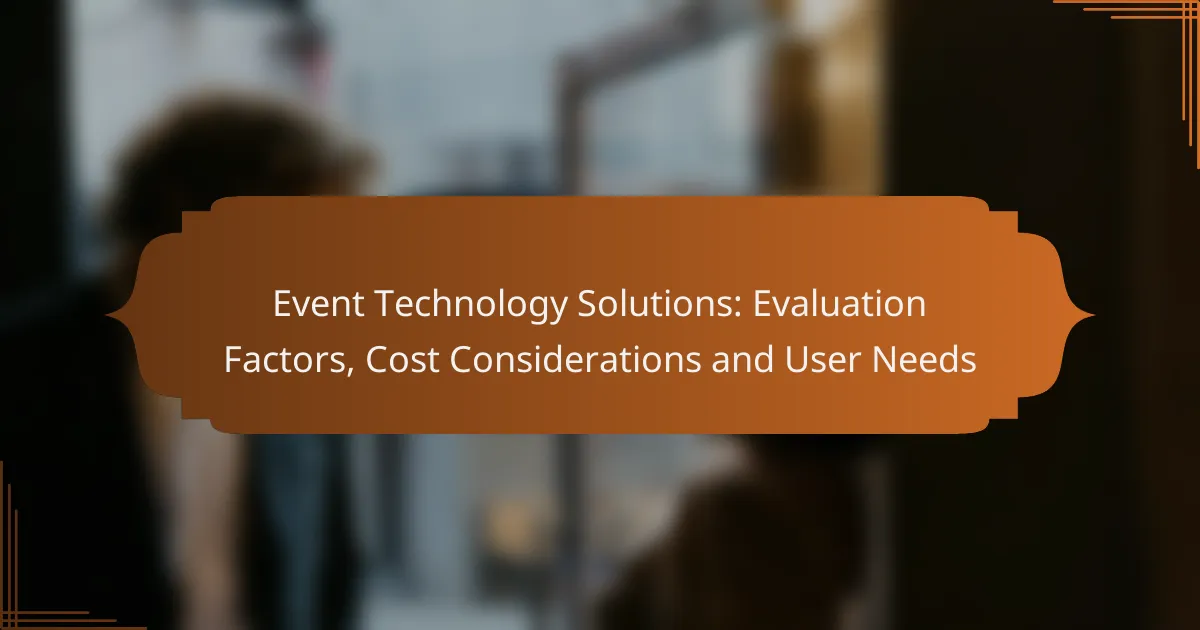Event technology tools play a crucial role in streamlining operations and enhancing efficiency for event planners. By automating repetitive tasks and improving communication, these tools allow organizers to focus on strategic elements while minimizing manual errors. Additionally, they foster attendee engagement through real-time interactions and personalized experiences, ultimately contributing to the success of any event.
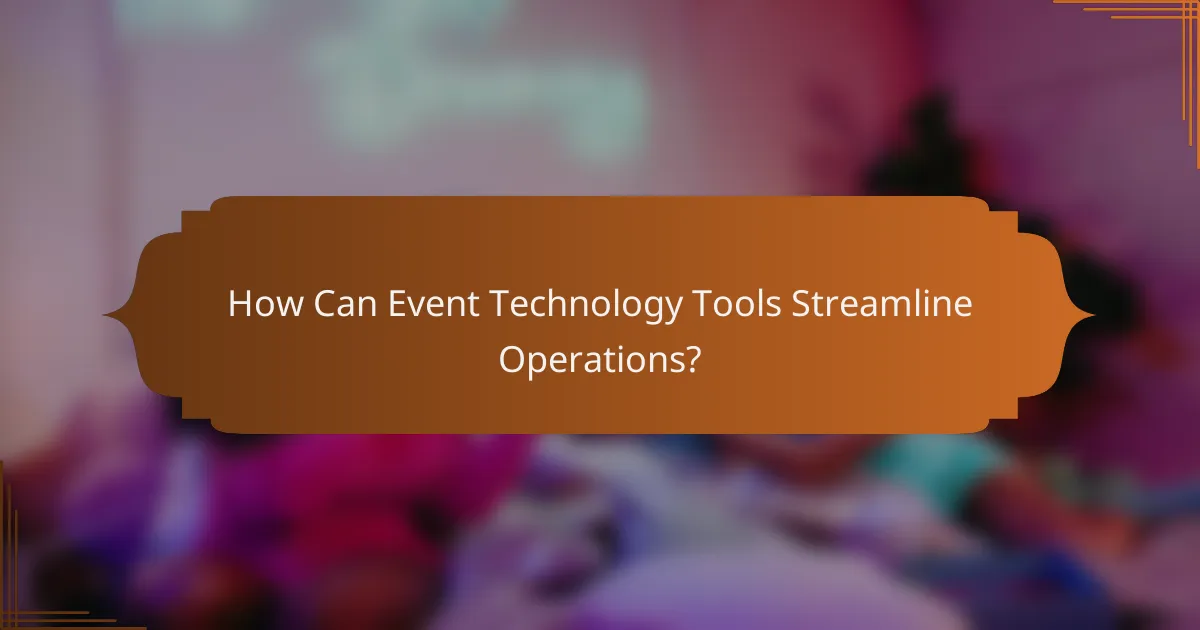
How Can Event Technology Tools Streamline Operations?
Event technology tools streamline operations by automating repetitive tasks, improving communication, and providing real-time insights. These tools enhance efficiency, reduce manual errors, and allow event planners to focus on strategic aspects of their events.
Automation of Registration Processes
Automating registration processes simplifies attendee sign-ups and reduces administrative workload. Tools can handle online registrations, ticketing, and payment processing, allowing for a seamless experience from the start.
Consider using platforms that offer customizable registration forms and automated confirmation emails. This not only saves time but also minimizes the chances of human error in data entry.
Real-time Data Analytics
Real-time data analytics provide insights into attendee behavior and engagement during events. By tracking metrics such as registration numbers, session attendance, and feedback, planners can make informed decisions on the fly.
Utilize dashboards that visualize key performance indicators (KPIs) to quickly assess what’s working and what needs adjustment. This data-driven approach can significantly enhance the overall event experience.
Integrated Communication Platforms
Integrated communication platforms facilitate seamless interaction among team members and attendees. These tools can centralize messaging, notifications, and updates, ensuring everyone is informed and engaged.
Look for solutions that combine email, chat, and social media integration to keep communication streamlined. This reduces the risk of miscommunication and enhances collaboration before, during, and after the event.
Resource Management Solutions
Resource management solutions help in efficiently allocating and tracking event resources, including staff, equipment, and venues. These tools can optimize scheduling and ensure that all necessary resources are available when needed.
Implement systems that allow for real-time updates and adjustments to resource allocation. This flexibility can prevent overbooking and ensure that all aspects of the event run smoothly, enhancing overall operational efficiency.
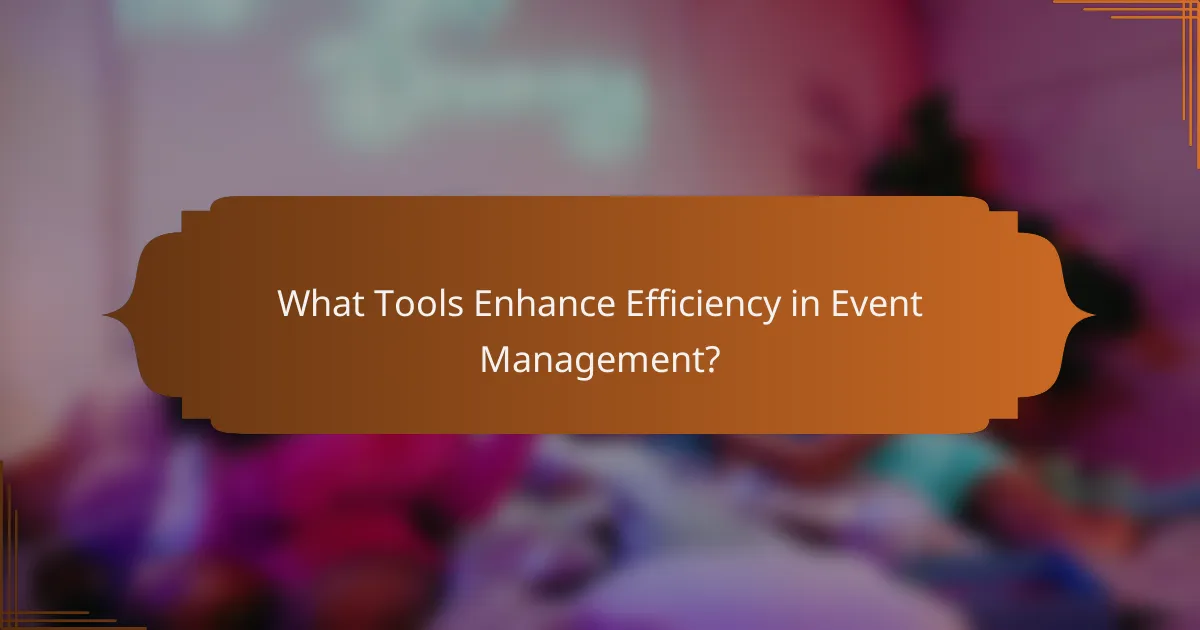
What Tools Enhance Efficiency in Event Management?
Event management tools significantly enhance efficiency by automating processes, improving communication, and streamlining operations. These tools help organizers manage logistics, engage attendees, and analyze performance, ultimately leading to more successful events.
Event Management Software
Event management software centralizes planning tasks, allowing organizers to manage registrations, schedules, and budgets in one platform. Popular options include Cvent, Eventbrite, and Whova, which offer features like ticketing, attendee tracking, and reporting tools.
When selecting software, consider factors such as user-friendliness, integration capabilities with other tools, and customer support. A good practice is to request demos or trials to evaluate how well the software meets your specific needs.
Mobile Event Apps
Mobile event apps enhance attendee engagement by providing real-time information and networking opportunities. These apps often include features like personalized agendas, interactive maps, and live polling, making it easier for participants to navigate the event.
To maximize the benefits of mobile apps, ensure they are user-friendly and encourage attendees to download them before the event. Offering incentives, such as exclusive content or giveaways, can boost adoption rates.
Virtual Event Platforms
Virtual event platforms facilitate online gatherings by providing tools for live streaming, breakout sessions, and audience interaction. Platforms like Zoom, Hopin, and Microsoft Teams have become essential for hosting webinars and hybrid events.
When choosing a virtual platform, assess its scalability, ease of use, and features that enhance engagement, such as chat functions and Q&A sessions. It’s crucial to test the platform ahead of time to troubleshoot any technical issues that may arise during the event.
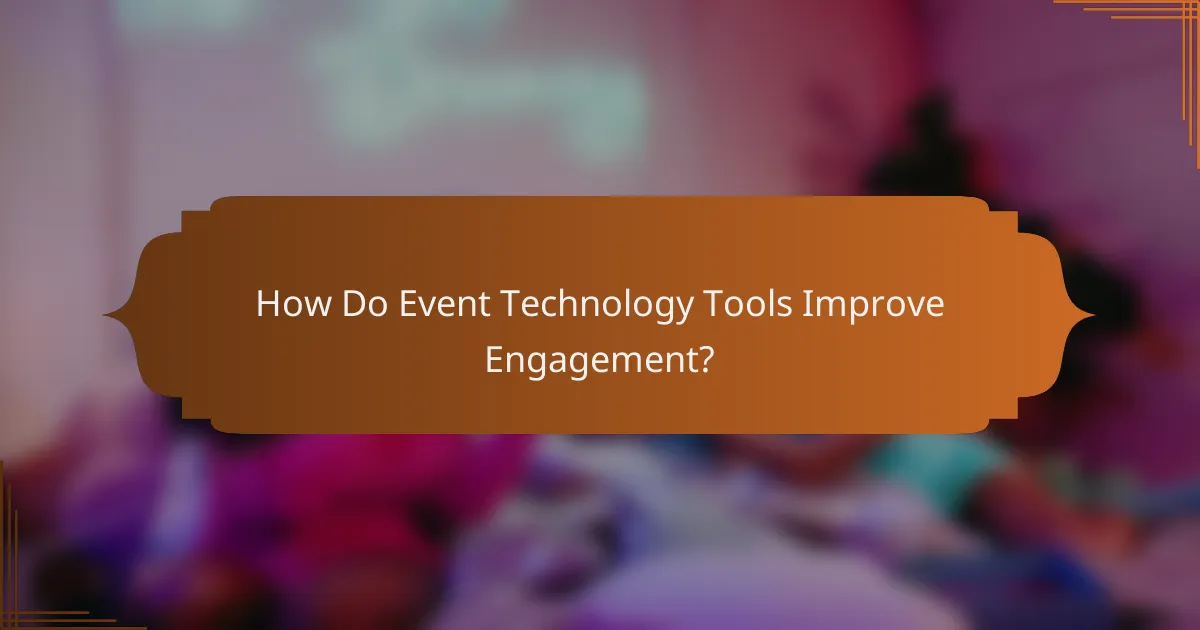
How Do Event Technology Tools Improve Engagement?
Event technology tools enhance engagement by facilitating real-time interaction and personalized experiences for attendees. These tools leverage various features to create dynamic environments that keep participants involved and invested throughout the event.
Interactive Audience Polling
Interactive audience polling allows event organizers to gather instant feedback and gauge participant opinions during sessions. By using mobile apps or web platforms, attendees can respond to questions in real-time, fostering a sense of involvement.
Consider using polling tools that offer anonymity to encourage honest responses. Polls can be integrated into presentations, allowing speakers to adjust their content based on audience reactions, which enhances overall engagement.
Gamification Features
Gamification introduces game-like elements into events, making participation more enjoyable and competitive. Features such as leaderboards, challenges, and rewards incentivize attendees to engage more actively with the content and each other.
To implement gamification effectively, define clear objectives and choose appropriate rewards that resonate with your audience. Simple strategies, like awarding points for participation or providing prizes for top performers, can significantly boost engagement levels.
Personalized Attendee Experiences
Personalized attendee experiences tailor content and interactions based on individual preferences and behaviors. By utilizing data collected from registrations and interactions, organizers can offer customized agendas, networking opportunities, and content recommendations.
To enhance personalization, consider using event apps that allow attendees to select topics of interest or connect with others who share similar goals. This approach not only improves satisfaction but also fosters meaningful connections among participants.
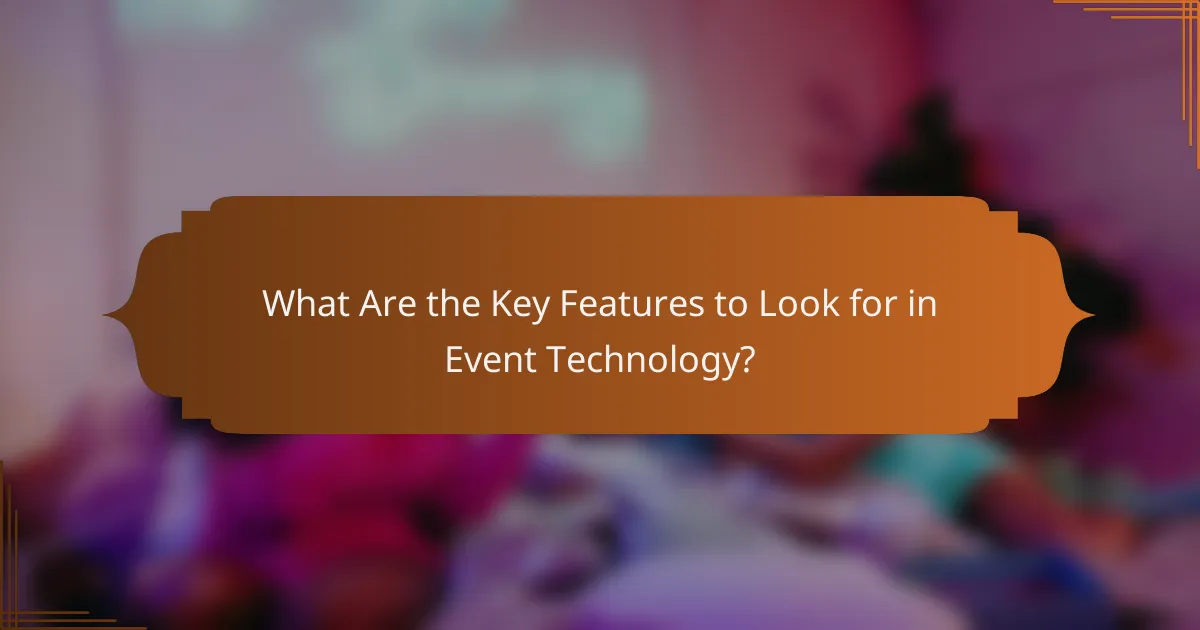
What Are the Key Features to Look for in Event Technology?
Key features to consider in event technology include user-friendly interfaces, scalability options, and integration capabilities. These elements ensure that the technology can effectively streamline operations, enhance efficiency, and improve engagement throughout the event lifecycle.
User-Friendly Interface
A user-friendly interface is crucial for both event organizers and attendees. It should be intuitive, allowing users to navigate the platform with ease, which minimizes training time and enhances overall satisfaction. Look for features like drag-and-drop functionality, clear menus, and responsive design.
For example, platforms that offer customizable dashboards enable users to tailor their experience, making it easier to access the tools they need quickly. This can significantly improve engagement during the event, as attendees can easily find information and interact with features.
Scalability Options
Scalability options are essential for accommodating varying event sizes and types. A good event technology solution should be able to handle small gatherings as well as large conferences without compromising performance. This flexibility allows organizers to adapt to changing needs and budgets.
When evaluating scalability, consider whether the platform can support additional features or increased user capacity as your events grow. For instance, a system that allows you to add more attendees or features seamlessly can save time and reduce stress during planning.
Integration Capabilities
Integration capabilities determine how well the event technology connects with other tools and platforms. A solution that integrates with CRM systems, marketing automation tools, and social media platforms can streamline processes and enhance data flow. This connectivity is vital for effective communication and engagement.
Ensure that the technology supports popular APIs and offers pre-built integrations with commonly used software. This can simplify tasks such as attendee registration, data analysis, and post-event follow-ups, ultimately leading to a more cohesive event experience.
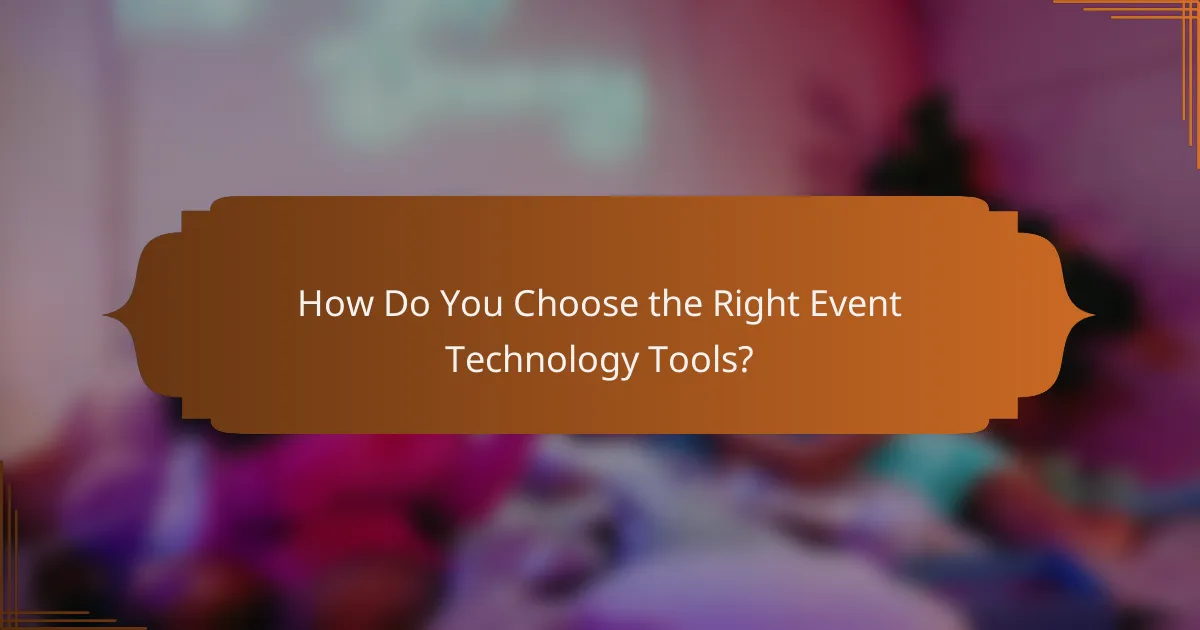
How Do You Choose the Right Event Technology Tools?
Choosing the right event technology tools involves evaluating your specific needs, budget, and the features that will enhance your event’s success. Focus on tools that streamline operations, improve efficiency, and foster attendee engagement.
Assessing Budget Constraints
When assessing budget constraints for event technology tools, start by determining how much you can allocate for software and hardware. Consider not only the initial costs but also ongoing expenses such as subscriptions, maintenance, and potential upgrades.
Evaluate different pricing models, such as one-time purchases versus subscription-based services. For example, subscription models can range from a few hundred to several thousand dollars annually, depending on the features offered. Make sure to compare what each tool provides for its price to ensure you get the best value.
To avoid overspending, prioritize essential features that align with your event goals. Create a checklist of must-have functionalities versus nice-to-have options, and stick to it while shopping around. This approach helps prevent impulse purchases that may not serve your event’s objectives effectively.
